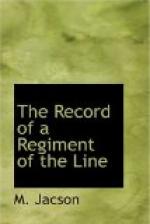General Buller rode at the head of his army, and received an immense ovation, as did all his regiments and artillery as they passed through the lines of the weedy, sickly-looking garrison. These with their thin, pale faces cheered to the full bent of their power, but after standing in the sun for some time they became exhausted, and Sir Redvers sent back word for them to sit down, which they gladly did, whilst the relievers, as they passed along, chucked them bits of tobacco, ready cut up, from their small store, small because they themselves were also hard put for luxuries.
The tramp! tramp! of these men, who to the weakly garrison appeared as veritable giants, will never be forgotten, as they hurried past to the strains of the Gordons’ pipes, cheering with the utmost enthusiasm the figure of Sir George White as they passed him. They were almost to a man reservists, well covered, hard, and well set up. They were filthy, their clothes were mended and patched, and most of them had scrubby beards. Tied on to their belts in almost all cases was a Boer blanket, telling that they had been busy in some Boer laager; on the top of this a small bundle of sticks for each man to cook his own tea, and by his side, attached to his belt, hung his black tin pot. But how well they looked—the picture of vigour, health, and strength, as they “tramp, tramp”—“tramp, tramp” through the town.
A corps that came in for a good deal of notice was the Bearer Company. They were at first taken for Boer prisoners, but when it became known who they were they were much cheered. Clad in worn-out “slops” they slouched along, in each man’s hand a pot of sorts, enamel or china, and a bundle of something over each man’s shoulder.
The meeting of the two battalions was not quite so emotional as has been depicted by some authors. The 2nd Battalion, the relievers, came through late at the rear of Buller’s army, and by that time the 1st Battalion, the relieved, had been in the sun, standing or sitting down on the curbstone, for some hours, and a great many men had fallen out exhausted. Still the meeting was very hearty, officers recognizing men and men old comrades. There was little time to enact the scene so graphically described by one author “which would make old men weep.” Buller’s army was straggled out a good deal and the rear had to catch up, so if a pal was seen he was gone next moment to give way to another pal. Most of the reservists had been through the ranks of the 1st Battalion, and with it through the Tirah Campaign; almost all were hurriedly recognized, and a hearty and hasty shake of the hand was all the greeting exchanged. Old jokes came to the fore, and were bandied from one to the other as the 2nd Battalion hurried along. There was no time for more—one battalion was in a hurry and the other exhausted.
[Illustration: Devon Officers Remaining Fit For Duty At The End of the Siege (Rajab—Regimental Barber)]




